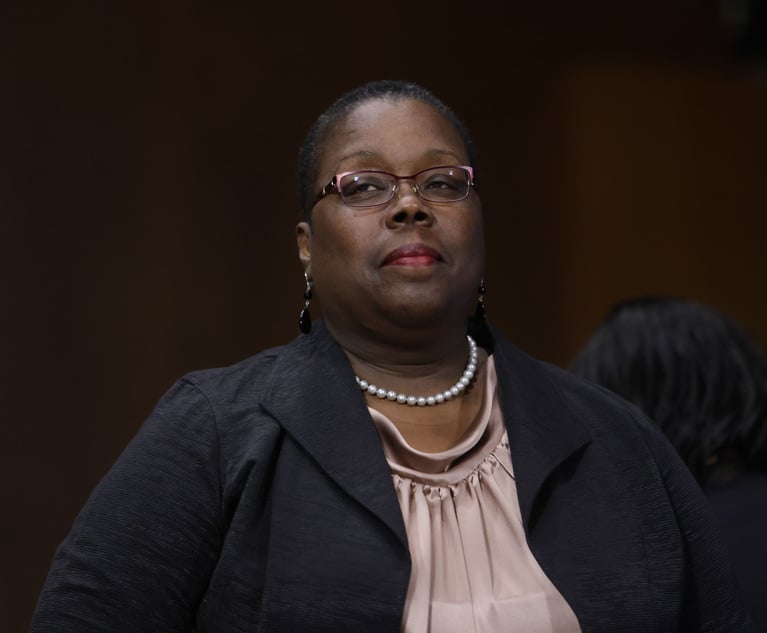 H&M retail store. Photo: Shutterstock.com
H&M retail store. Photo: Shutterstock.comH&M Gets Another Shot at Challenging Validity of Pattern Copyright
A Ninth Circuit panel found that a trial court erred by failing to route a question to the copyright office over whether known inaccuracies in Unicolor's application to register a copyright for a pattern would have led the office to refuse registration.
May 29, 2020 at 06:20 PM
4 minute read
A federal appellate court has reversed a copyright infringement trial loss for clothing retailer H&M Hennes & Mauritz LP, finding that the district judge below erred in evaluating the company's defense that textile designer Unicolors Inc. had included known inaccuracies in its application to register a copyright for the pattern at the center of the dispute.
The U.S. Court of Appeals for the Ninth Circuit on Friday held that U.S. District Judge Andre Birotte Jr. of the Central District of California should have requested that the Register of Copyrights advise him as to whether Unicolor's inclusion of inaccurate information would have caused the agency to refuse registration rather than making the determination himself in the first instance. The panel also found the Birotte erred in imposing an intent-to-defraud requirement for H&M to invalidate Unicolor's registration.
In practical terms, the decision tosses Unicolor's damages award of $266,209.33 and attorneys' fees and costs of $508,709.20 and $5,856.27, respectively. But perhaps more importantly to H&M and others in the fashion industry accused of copyright, the opinion provides clarity on a potential route to challenge registration in instances where a "single-unit" registration is used to claim copyright protection over multiple works.
Staci Jennifer Riordan of Nixon Peabody who represents H&M in the case said that the decision follows a string of cases that have given defense lawyers "tools in their toolbox" to challenge registration. The decision comes after last year the U.S. Supreme Court held in Fourth Estate Public Benefit v. Wall-Street.com that a claimant must hold a registered copyright, rather than just a filed application, to sue for infringement. The Ninth Circuit just two months later in Gold Value International Textile v. Sanctuary Clothing held that a showing of fraud on the part of the claimant isn't necessary to invalidate a copyright registration.
"A valid copyright registration is a prerequisite to any copyright suit, and this opinion provides much-needed clarity, and scrutiny, on the validity of group registrations—which are often the basis for dubious litigation," Riordan said.
In the underlying case, Unicolor claimed that H&M copied the disputed design "row by row, layer by layer" in a skirt and jacket on sale in the retailer's stores in Fall 2015. H&M's lawyers, however, argued that the design had been included as part of a batch of 31 separate designs Unicolor included in one registration. To register the collection as a "single unit," as Unicolors did, H&M maintained that the works must have been first sold or offered for sale in some integrated manner. But the registration, Unicolor witnesses testified at trial, included both designs, which Unicolor made available for sale to the public and so-called "confined" works, which were designated for a specific customer and kept private.
In Friday's opinion, Judge Carlos Bea of the U.S. Court of Appeals for the Ninth Circuit wrote "that a collection of works does not qualify as a 'single unit of publication' unless all individual works of the collection were first published as a singular, bundled unit" and that Unicolor had provided inaccurate information to the copyright register since some of its designs had been offered to only single, exclusive customers. Bea, who was joined in his opinion by Judge Bridget Bade of the U.S. Court of Appeals for the Ninth Circuit and U.S. District Judge Jon Phipps McCalla of the Western District of Tennessee sitting by designation, further concluded that Birotte, the trial judge, was required under federal copyright law to request that the Register of Copyrights advise him about whether registration would have been refused had the inaccurate information been known.
"Because the district court did not make the statutorily required request, we remand the case so that the district court can complete this requirement before deciding whether Unicolors's registration is invalid, which would require dismissing Unicolors's claims and entering judgment in favor of H&M," Bea wrote.
Unicolor's counsel, Stephen Doniger of Doniger Burroughs in Venice, California, did not respond to a message seeking comment.
Nixon Peabody's Riordan said Friday's win was "extremely gratifying," especially considering that, prior to the decisions of the past year, it was difficult to rebut the presumption of validity of a copyright.
This content has been archived. It is available through our partners, LexisNexis® and Bloomberg Law.
To view this content, please continue to their sites.
Not a Lexis Subscriber?
Subscribe Now
Not a Bloomberg Law Subscriber?
Subscribe Now
NOT FOR REPRINT
© 2024 ALM Global, LLC, All Rights Reserved. Request academic re-use from www.copyright.com. All other uses, submit a request to [email protected]. For more information visit Asset & Logo Licensing.
You Might Like
View All

Pre-Internet High Court Ruling Hobbling Efforts to Keep Tech Giants from Using Below-Cost Pricing to Bury Rivals
6 minute read
Amazon's Audible Hit With Privacy Class Action Over Use of Tracking Pixels

Meet the Pacific Northwest Judges Who Rejected the Kroger-Albertsons Supermarket Merger
4 minute readLaw Firms Mentioned
Trending Stories
- 1Tuesday Newspaper
- 2Judicial Ethics Opinion 24-85
- 3Decision of the Day: Administrative Court Finds Prevailing Wage Law Applies to Workers Who Cleaned NYC Subways During Pandemic
- 4Trailblazing Broward Judge Retires; Legacy Includes Bush v. Gore
- 5Federal Judge Named in Lawsuit Over Underage Drinking Party at His California Home
Who Got The Work
Michael G. Bongiorno, Andrew Scott Dulberg and Elizabeth E. Driscoll from Wilmer Cutler Pickering Hale and Dorr have stepped in to represent Symbotic Inc., an A.I.-enabled technology platform that focuses on increasing supply chain efficiency, and other defendants in a pending shareholder derivative lawsuit. The case, filed Oct. 2 in Massachusetts District Court by the Brown Law Firm on behalf of Stephen Austen, accuses certain officers and directors of misleading investors in regard to Symbotic's potential for margin growth by failing to disclose that the company was not equipped to timely deploy its systems or manage expenses through project delays. The case, assigned to U.S. District Judge Nathaniel M. Gorton, is 1:24-cv-12522, Austen v. Cohen et al.
Who Got The Work
Edmund Polubinski and Marie Killmond of Davis Polk & Wardwell have entered appearances for data platform software development company MongoDB and other defendants in a pending shareholder derivative lawsuit. The action, filed Oct. 7 in New York Southern District Court by the Brown Law Firm, accuses the company's directors and/or officers of falsely expressing confidence in the company’s restructuring of its sales incentive plan and downplaying the severity of decreases in its upfront commitments. The case is 1:24-cv-07594, Roy v. Ittycheria et al.
Who Got The Work
Amy O. Bruchs and Kurt F. Ellison of Michael Best & Friedrich have entered appearances for Epic Systems Corp. in a pending employment discrimination lawsuit. The suit was filed Sept. 7 in Wisconsin Western District Court by Levine Eisberner LLC and Siri & Glimstad on behalf of a project manager who claims that he was wrongfully terminated after applying for a religious exemption to the defendant's COVID-19 vaccine mandate. The case, assigned to U.S. Magistrate Judge Anita Marie Boor, is 3:24-cv-00630, Secker, Nathan v. Epic Systems Corporation.
Who Got The Work
David X. Sullivan, Thomas J. Finn and Gregory A. Hall from McCarter & English have entered appearances for Sunrun Installation Services in a pending civil rights lawsuit. The complaint was filed Sept. 4 in Connecticut District Court by attorney Robert M. Berke on behalf of former employee George Edward Steins, who was arrested and charged with employing an unregistered home improvement salesperson. The complaint alleges that had Sunrun informed the Connecticut Department of Consumer Protection that the plaintiff's employment had ended in 2017 and that he no longer held Sunrun's home improvement contractor license, he would not have been hit with charges, which were dismissed in May 2024. The case, assigned to U.S. District Judge Jeffrey A. Meyer, is 3:24-cv-01423, Steins v. Sunrun, Inc. et al.
Who Got The Work
Greenberg Traurig shareholder Joshua L. Raskin has entered an appearance for boohoo.com UK Ltd. in a pending patent infringement lawsuit. The suit, filed Sept. 3 in Texas Eastern District Court by Rozier Hardt McDonough on behalf of Alto Dynamics, asserts five patents related to an online shopping platform. The case, assigned to U.S. District Judge Rodney Gilstrap, is 2:24-cv-00719, Alto Dynamics, LLC v. boohoo.com UK Limited.
Featured Firms
Law Offices of Gary Martin Hays & Associates, P.C.
(470) 294-1674
Law Offices of Mark E. Salomone
(857) 444-6468
Smith & Hassler
(713) 739-1250






